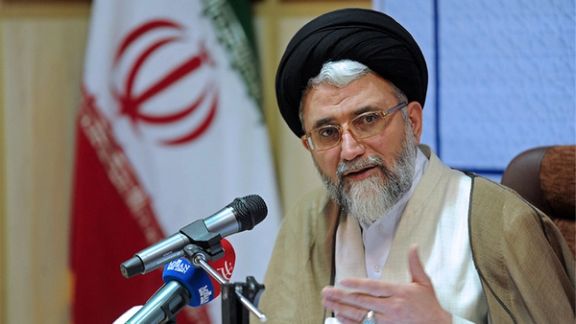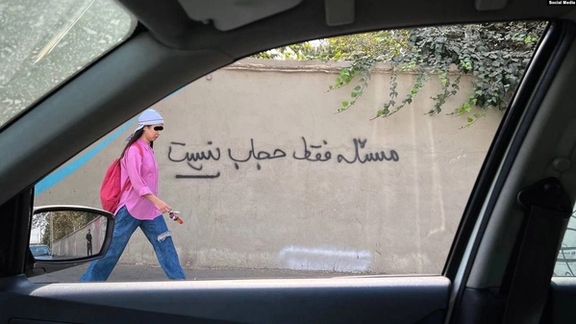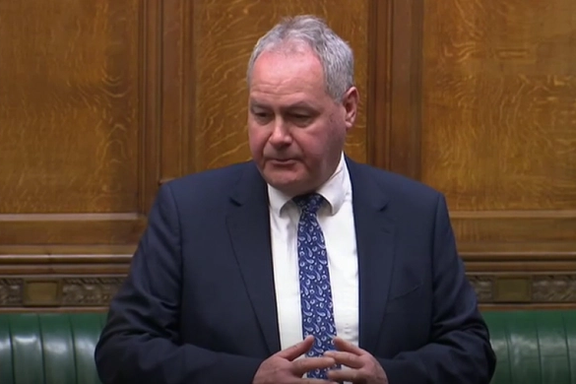Iran’ Intelligence Chief Issues Veiled Threat Against UK

Iran’s intelligence minister has implicitly threatened the UK of terrorist operations after the country decried attempted menacing acts against two London-based Iran International journalists.

Iran’s intelligence minister has implicitly threatened the UK of terrorist operations after the country decried attempted menacing acts against two London-based Iran International journalists.
In an interview with the official website of the Supreme Leader, published on Wednesday, Esmail Khatib said the Islamic Republic recognizes Iran International as “a terrorist organization,” adding that its workers and anyone affiliated with the channel will be pursued by the Ministry of Intelligence.
In a statement on Monday, Volant Media -- the parent company of Iran International – said that two of their journalists have recently been notified of the threats. “The Metropolitan Police have now formally notified both journalists that these threats represent an imminent, credible and significant risk to their lives and those of their families. Other members of our staff have also been informed directly by the Metropolitan Police of separate threats," read the statement.
Khatib did not explicitly state that the Islamic Republic will carry out attacks in the UK but said it “would not commit itself to countering insecurities," emanating from other countries.
"We will never sponsor acts of terrorism and insecurity in other countries, as Britain does, but we also have no obligation to prevent insecurity in those countries either. Therefore, Britain will pay for its actions aimed at making Iran insecure," the minister warned.

Echoing remarks by the Supreme Leader and other officials, he blamed the UK, US, Israel and Saudi Arabia for the current wave of protests across Iran – ignited by the death in custody of a 22-year-old Kurdish woman, Mahsa Amini.
He claimed that a “hybrid war” has been launched against the Islamic Republic, including an “influence operation” to destabilize the country, adding that the role of Israel was more obvious in field operations while UK’s role was more in terms of propaganda. He added that Saudi Arabia provided financial support for the operations against the Islamic Republic, especially for protests abroad, such as a huge demonstration in Berlin last month. The huge rally of diaspora Iranians in the German capital in October angered the government in Tehran which tried to belittle the opposition gathering.
“Unfortunately, the British government, which supports the BBC and Iran International satellite channels that operate within its media framework, has taken on a terrorist role today,” he said, calling it “crossing the security red lines of the Islamic Republic.”
His remarks came after the threat was discussed during a Tuesday meeting of the British House of Commons on whether to designate Iran’s Revolutionary Guard as a terrorist organization.
"British-Iranian reporters who are now sited in the UK have been issued with credible information by the police that the Islamic Revolutionary Guard Corps threatens their lives. What more does IRGC have to do before we proscribe them in their entirety?" Conservative British MP Bob Blackman said at the meeting.

Later on Tuesday, the Committee to Protect Journalists asked British authorities to strengthen their protection of threatened staff members of Iran International, demanding that they hold the Islamic Republic accountable for its transnational crimes.
“Time and again Iranian authorities have acted with impunity in attempting to silence journalists around the world,” said Sherif Mansour, CPJ’s Middle East and North Africa program coordinator.
“UK authorities must ensure the safety of Iran International’s staff and send a message that threats to journalists on its soil will not be tolerated. Until foreign governments hold Iran accountable, this trend will only worsen, and journalists will continue to face unacceptable threats to their safety.”